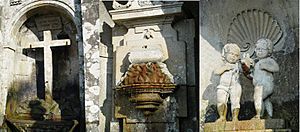Theological virtues facts for kids
Theological virtues are special qualities or good habits that Christians believe come from God. These virtues help people connect with God and are important for salvation, which means being saved and having a relationship with God. The three main theological virtues are Faith, Hope, and Charity (which means Love).
These virtues are called "theological" because they are all about God. They help people understand and relate to God, and Christians believe God gives them to people. We learn about them mainly from the Bible.
Contents
What the Bible Says
Paul's Letters
The idea of these three virtues first appears in the Bible in the letters written by Saint Paul. In his first letter to the Thessalonians, he talks about "your work of faith and labor of love and endurance in hope." He mentions them again, saying Christians should have "the breastplate of faith and love and the helmet that is hope for salvation."
In another important letter, 1 Corinthians 13, Paul says that love is the most important of the three. He writes, "So faith, hope, love remain, these three; but the greatest of these is love." This is because love helps the other two virtues. It "bears all things, believes all things, hopes all things, endures all things." Some Christian thinkers, like Augustine of Hippo, believed that while faith and hope are important now, love will last forever.
Thomas Aquinas's Ideas
A famous thinker named Thomas Aquinas explained that theological virtues are special because they focus on God. He said they help us connect with God, are given to us by God, and we learn about them through God's word in the Bible.
Aquinas also thought that these virtues help people do good things that they might not be able to do on their own. He believed that faith means trusting in what God says, even if we don't fully understand it, because God is always truthful.
Different Christian Teachings
Catholic Church
The Catechism of the Catholic Church teaches that faith, hope, and love help Christians live in a relationship with God (the Holy Trinity). These virtues come from God, are motivated by God, and are directed towards God. They help people know God through faith, hope in God, and love God for who He is.
Moravian Church
The Moravian Church also believes these virtues are very important. They teach that "God creates; God redeems; God blesses. And we respond in faith, in love and in hope." Moravian Christians often think about how strong their faith, how wide their love, and how hopeful their lives are.
Anglican Communion
Churches in the Anglican Communion, like the Catholic Church, also follow the ideas of Augustine and Aquinas. They believe faith helps us know God, hope helps us perfect our will, and love is the ultimate perfection. Richard Hooker, an Anglican theologian, said that faith helps us find wisdom in Christ, hope helps us find goodness in Christ, and love helps us see the beauty of Christ.
Understanding Each Virtue

Christians believe that these virtues are "infused" into a person, meaning God gives them as a gift through Divine grace. They are called theological because their main focus is God.
- Faith is a special gift from God that helps your mind believe the truths God has shown us. You believe these truths not because you can see them or prove them with science, but because you trust that God, who reveals them, is always right. It's like trusting someone completely because you know they always tell the truth. The First Vatican Council said that faith is a gift from God, and it helps us believe what He has revealed, even if we don't fully understand it.
- Hope is another gift from God that helps your will. It makes you trust that, with God's help, you can reach life everlasting (eternal life with God). It gives you confidence in the future. The opposite of hope is despair, which means giving up.
- Charity (Love) is a God-given virtue that makes your will want to love God above everything else, just for who He is. It also makes you love other people because of your love for God. To love God means wishing Him all honor and glory and trying to do what pleases Him. The Bible says that if you love God, you will keep His word, and God will love you and be with you. Not having love can lead to hatred, anger, or not caring about others.
Virtues: Given by God vs. Learned by Practice
Theological virtues are different from cardinal virtues (like courage or honesty). Cardinal virtues are good habits that people can develop and strengthen through practice and effort. However, Catholic teaching says that theological virtues cannot be earned by human effort alone. Instead, they are gifts from God.
Even though they are gifts, when a person uses these virtues, they become stronger and grow. This means the person becomes even more ready to practice them.
Pope Benedict XVI wrote three important letters (called encyclicals) about each of these theological virtues: Deus caritas est (about love), Spe salvi (about hope), and Lumen fidei (about faith).
See also
 In Spanish: Virtudes teologales para niños
In Spanish: Virtudes teologales para niños
- Cardinal virtues
- Seven deadly sins
- Seven virtues
- Christian ethics
 | Roy Wilkins |
 | John Lewis |
 | Linda Carol Brown |

